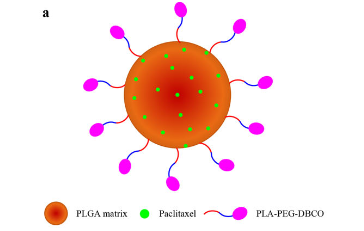
Mesenchymal stem cells (MSCs) can be used for tumor‐specific delivery of small molecular weight anticancer drugs by using nanoparticle‐encapsulated forms of the drugs. In a recent study, an advanced nanoengineering strategy is reported here that involves generation of MSCs expressing azide functional groups on their surface and conjugation of dibenzyl cyclooctyne‐functionalized nanoparticles by PLA-PEG-NH2 (Nanosoft Polymers) to the azide groups using copper‐free click chemistry. This novel strategy significantly improves the payload capacity of MSCs (≈48 pg of paclitaxel (PTX) per cell) relative to that reported previously (<1–20 pg per cell), without affecting their native phenotype. In vivo, the nanoengineered MSCs significantly inhibit tumor growth (p < 0.05) and improve survival (p < 0.0001) compared to free or nanoparticle encapsulated PTX and Abraxane in an orthotopic ovarian tumor model. In summary, the nanoengineering strategy reported here allows for improved delivery and anticancer efficacy of conventional chemotherapeutic agents using MSCs as drug carriers. Adv. Therap.2019, 1900043. https://onlinelibrary.wiley.com/doi/epdf/10.1002/adtp.201900043
